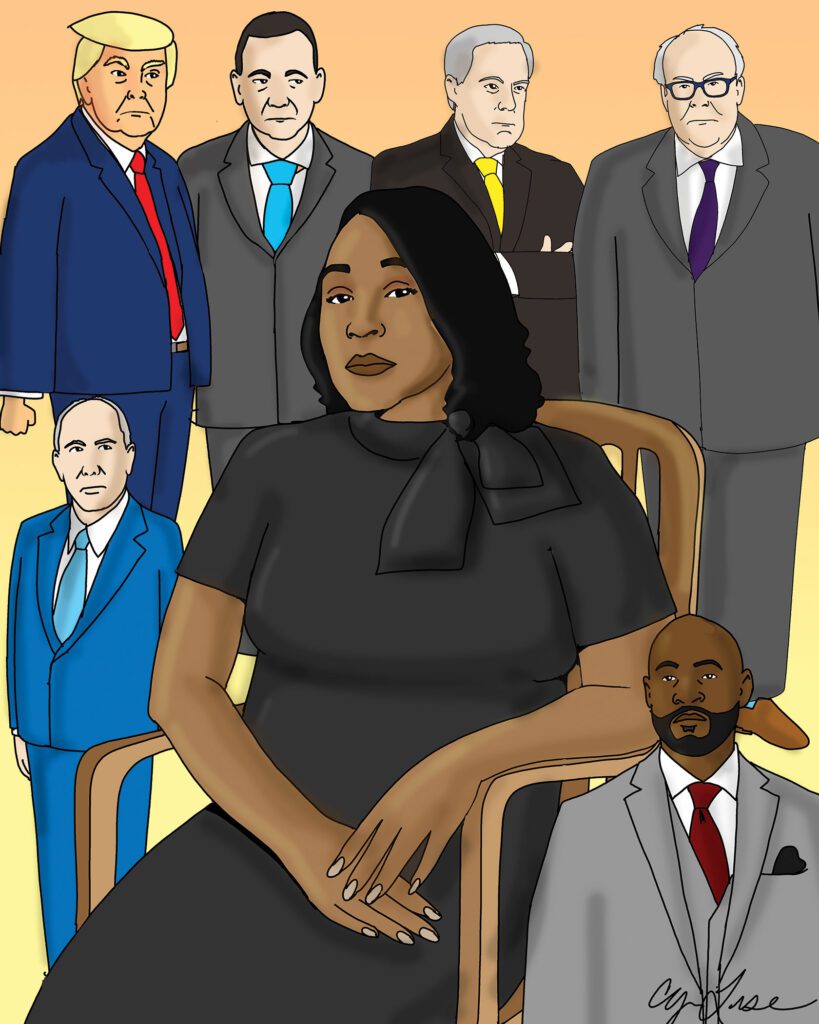
As the 2024 presidential election moves closer, a number of crucial court cases against likely GOP nominee Donald Trump are also moving forward. Along with the federal case of election interference, none is more important than legal proceedings in Georgia, where the insurrectionist former president is charged with attempting to steal the election from Georgia voters. The case against Trump, who asked the state official in charge of counting ballots to find him over 11,000 additional votes to change the election outcome, was brought by Fulton County District Attorney Fani Willis. The prosecutor’s indictments involve 19 defendants accused of conspiracy to overturn the results of the 2020 presidential election in the Peach State.
The grand jury convened by Willis returned indictments on 41 counts, including 13 against Trump, ranging from election fraud to racketeering. The charges painted a picture of a broad criminal conspiracy, which Willis likened to the actions of an organized crime family intent on subverting the law with “multiple participants all participating in multiple illegal actions for mutual benefits.”
The racketeering charges were especially ironic, given that Trump associate Rudy Giuliani first made his reputation using federal racketeering statutes to go after New York mob leaders during his tenure in the 1980s as U.S. attorney in New York.
The Georgia case is so crucial because it is in state court, and therefore not subject to a presidential pardon — whether by Trump himself, if he regains the White House in November, or by his GOP rival Nikki Haley, who indicated she would do so during a recent campaign stop. If found guilty in a Georgia court, no federal pardon will rescue him from the decision of a Georgia judge to sentence him to jail for attempting to subvert democracy.
Among the evidence put forward is Trump’s recorded conversation with Georgia Secretary of State Brad Raffensperger, in which the frustrated commander in chief, clearly not understanding the gravity of his demand, sounds like a student asking to be bumped up from a B- to a B. “So what are we going to do here, folks? I only need 11,000 votes,” said Trump from the Oval Office after losing the election to Joe Biden. “Fellas, I need 11,000 votes. Give me a break.”
Another factor is the case running on a schedule controlled by the state judge in Georgia, not by a federal judge who may have been appointed by Donald Trump. This concern is not abstract, as a federal jurist placed on the bench by the former president handed down a ruling to delay the federal case, benefitting Trump.
Now, as the Georgia case is about to start, a major hitch has arisen in the disclosure of Fani Willis’ romantic relationship with Nathan Wade, the special prosecutor she appointed to oversee the case.
On the surface, the personal alliance between the two has all the makings of a salacious scandal involving sex, money and power. But based on recent testimony of Willis and Wade, there is no evidence of misuse of funds or power. Their relationship did not begin until after Wade’s appointment. Payments for Wade’s work were not used to finance trips they took together, as Willis testified that she paid her own way. Moreover, the work assigned to Wade was completed with no extra or inappropriate funds advanced to him.
Besides, how any individual prosecutor spends his or her own money should not be the concern of Donald Trump’s defense team.
That said, of course the two should not have pursued a personal relationship, given the enormous stakes of the legal case and the certainty of public knowledge of their intimate lives impacting public perception of their work.
The bottom line is not to be distracted by the use of the romantic liaison as a Trump defense team stalling tactic. Nor its use to distract us from the fact that a sitting president of the United States, after losing a free and fair election, conspired to rig the results and got caught on tape doing so. And when that didn’t work, he engaged in actions fomenting riot and insurrection to block the peaceful transfer of power and derail democracy as we know it.
While we expect better choices from our prosecutors about the conduct of their personal lives, we should not allow this distraction to upend the state case against Trump. We need to remind ourselves who’s really on trial and what’s at stake.







